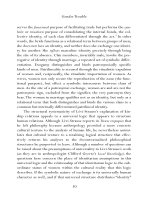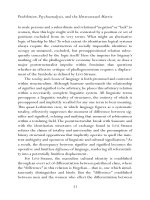GENDER TROUBLE 136
Bạn đang xem bản rút gọn của tài liệu. Xem và tải ngay bản đầy đủ của tài liệu tại đây (20.81 KB, 1 trang )
3
Subversive Bodily Acts
i. The Body Politics of Julia Kristeva
Kristeva’s theory of the semiotic dimension of language at first appears
to engage Lacanian premises only to expose their limits and to offer a
specifically feminine locus of subversion of the paternal law within language.1 According to Lacan, the paternal law structures all linguistic signification, termed “the Symbolic,” and so becomes a universal organizing
principle of culture itself. This law creates the possibility of meaningful
language and, hence, meaningful experience, through the repression of
primary libidinal drives, including the radical dependency of the child
on the maternal body. Hence, the Symbolic becomes possible by repudiating the primary relationship to the maternal body. The “subject” who
emerges as a consequence of this repression becomes a bearer or proponent of this repressive law.The libidinal chaos characteristic of that early
dependency is now fully constrained by a unitary agent whose language
is structured by that law.This language, in turn, structures the world by
suppressing multiple meanings (which always recall the libidinal multiplicity which characterized the primary relation to the maternal body)
and instating univocal and discrete meanings in their place.
Kristeva challenges the Lacanian narrative which assumes cultural
meaning requires the repression of that primary relationship to the
maternal body. She argues that the “semiotic” is a dimension of language
occasioned by that primary maternal body, which not only refutes
Lacan’s primary premise, but serves as a perpetual source of subversion
within the Symbolic. For Kristeva, the semiotic expresses that original
101









